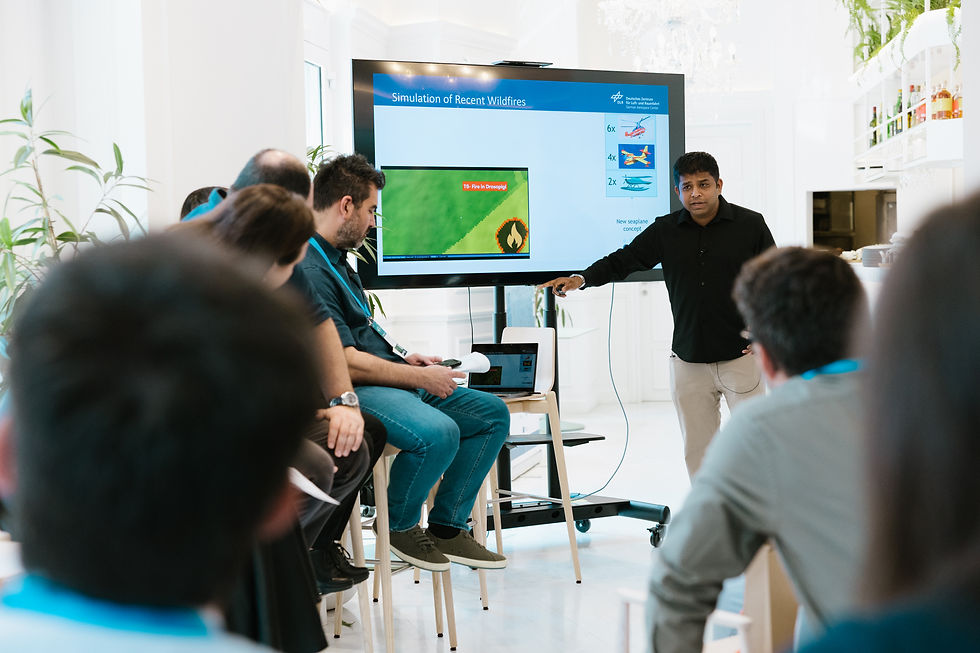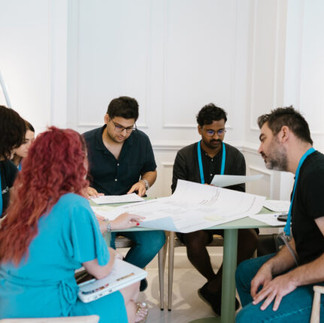RefMap Hosts Aviation Twin Transition Cluster Event in Athens
- RefMap

- Aug 28, 2025
- 3 min read
Updated: Sep 3, 2025
This post was originally published by Future Needs, RefMap Dissemination Leader and Research Partner, and is reproduced here with minor edits with permission. See the original article here.

Innovation doesn’t happen in isolation – it happens when diverse minds come together to connect ideas, tools, and teams, shaping the future. That was exactly the spirit behind the Aviation Twin Transition (ATT) Clustering Event, hosted by the RefMap project and organised by Future Needs on 29–30 July 2025 at Π55 Coworking Space in Athens.
Almost 50 experts from across Europe gathered for a two-day event dedicated to advancing the green and digital transitions in aviation and urban air mobility.
The Aviation Twin Transition Cluster was founded by the RefMap Project. Funded by the European Commission, members of the Aviation Twin Transition Cluster are working to develop and demonstrate new technologies that further digitalise and automate the European aviation sector and make aviation greener, more circular, and globally competitive.
Setting the Stage for Connection and Collaboration

The event opened with welcoming remarks from Anna Palaiologk (Founder, Future Needs), alongside Gerardo Zampino (RefMap Project Manager, KTH Royal Institute of Technology) and Georgios Bampanis (European Commission, CINEA). Together, they framed the goals and ambitions driving this clustering activity.
We were honoured to welcome keynote speakers Ioanna Katsarou (DG MOVE, European Commission) and Ignacio Garcia Vega (IGAVE Innovations), who shared forward-thinking perspectives on EU policy and the role of digital twins in shaping sustainable urban futures.
Engaging Panels
Each panel offered a deep dive into specific challenges and opportunities for aviation and UAM, bringing together researchers, industry leaders, and policy experts.
The “Showcasing Digital Leadership” panel, moderated by Anna Palaiologk, featured four forward-looking demonstrations: Sotiris Xydis (ICCS, RefMap) presented the RefMAP platform; Fateme Baneshi (UC3M, RefMap) shared a multi-agent AI approach to aircraft trajectory planning; Milan Rollo (AgentFly, ImAFUSA) explored public acceptance of drone traffic; and Prajwal Prakasha (DLR, Colossus) presented Colossus project outcomes. The discussion revealed how digital innovation is already steering aviation’s twin transitions.

In the “Future Aviation Economy” panel, moderated by Nikoleta Krousouloudi (Future Needs), the focus turned to user needs and business readiness. Anna Palaiologk (Future Needs, RefMap) examined expectations for sustainability tools; Kyriaki Daskaloudi (Future Needs, ImAFUSA) addressed welfare in UAM; Petros Masouridis (WaltR) explained how AI can reduce emissions via APU monitoring; and Dr. Stefan Kaufmann (TransHyDE 2.0) posed critical questions about the impact of green fuel quotas on the hydrogen economy.
The “Sustainability Challenges in Aviation” panel, led by Milan Rollo (AgentFly, ImAFUSA), brought together technical and policy perspectives. From Prof. Antonio J. Torija Martinez’s (University of Salford, RefMap) advances in drone noise modelling to Abolfazl Simorgh’s (UC3M Carlos III University of Madrid, RefMap) insights on contrail mitigation, the panel covered urgent environmental issues. Gerardo Zampino (KTH Royal Institute of Technology, RefMap), Angelos Filippatos (University of Patras), and Constantin Tzembelicos (Element Aerospace Limited, Di-Pegasus) rounded out the session with talks on turbulence, holistic aviation design, and what seaplanes can teach us about UAM.

The final panel of the day, focused on Regulatory and Operational Challenges, was moderated by Prof. Antonio J. Torija Martinez. The panel featured Marina Basimakopoulou (Hellenic Civil Aviation Authority) discussing regulatory challenges related to the Single European Sky, Raffaello Mariani (KTH Royal Institute of Technology, ImAFUSA) addressing perceived safety in U-Space drone usage, Zorana Milosevic (Universidad Politécnica de Madrid, Airship) introducing autonomous electric ground-effect cargo craft, and Ioanna Moscholidou (University of the Aegean, Di-Pegasus) covering sustainability issues and policy objectives for seaplanes in Greece.
The day wrapped up with a rooftop networking session overlooking the Acropolis – a relaxed setting for informal conversations and connections.












































































































































